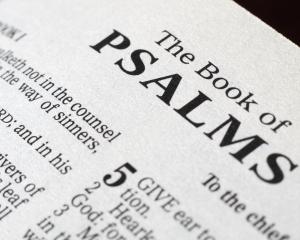Peter Matheson contemplates spirituality and religion in what could be a post-secular age.
Have you noticed?
These days spirituality is "in''.
Whether we are talking about healthcare, education, social work or the care of the dying, there is a feeling abroad that in our modern, secularised world something quite essential has been missing.
Often defined as a quest for meaning and connection, "spirituality'' may be filling the vacuum left by the decline of the churches.
Charles Taylor, one of the most influential thinkers about the rise of modernity, has argued that in the modern world our "social imaginary'', the way we see the world around us, has become disenchanted.
In our secularised world we have become "buffered'' selves, cut off from transcendent sources of being. In reaction to this the pendulum has swung again, though.
The current vogue for spirituality will be one indicator of that.
There is talk of us entering a post-secularist era.
There is, for example, an openness to Maori and Pacific Island spirituality, and a recognition of the wonder and mystery of life, of relationships, of the natural world.
Many who were brought up as Catholics or Protestants no longer look to the churches and their clergy for their weddings or funerals but they do turn to celebrants who craft for them a more appropriate form of service, a spiritual discourse free of traditional language.
There is also a growing awareness that in Africa, South America, Asia, the Middle East religion is booming, and that our European, post-Enlightenment, humanist culture is becoming something of an erratic boulder on the world stage.
This new fascination with spirituality, then, is understandable and encouraging.
In its breadth and empathy it can be most attractive.
Yet it has its pitfalls, and not only in the excesses and irrationality of some of the glossy literature you can find in any bookshop.
We all stand on our own soapbox.
Mine is that of the Judaeo-Christian tradition.
I happen to come from a long line of Protestant pastors, went through the usual ministerial training in Latin, Hebrew and Greek languages, historico-critical methods, ecumenical engagement, dialogue with Enlightenment thought, abrupt confrontation with social injustice, Vietnam, all the rest of it.
So I speak from that particular stance.
My experience suggests dangers lurk in the supersessionist presuppositions of much contemporary culture: we tend to live and think, in other words, as if we today have progressed far beyond the narrowness of the "faith of our fathers''.
The heritage of the Hebrew prophets, of Augustine, or the medieval mystics is old hat.
There is that reductive, flattening tendency in some spirituality discourse.
Religion need not be a boo word, either.
It means bonding and does offers what one might call rootage, a way of scanning reality from the alienating perspective of millennia of history.
At its best it connects us, as we used to say, to the saints and martyrs of every age.
Faith cannot be picked up wandering down a supermarket aisle, so to speak, choosing whatever values happen to appeal to us. Well, it can, of course, but it will be pretty superficial, a throwaway job.
For me, the ongoing rubbing of shoulders with the living community of the church, local and universal, is a constant corrective to my own individualist preferences and moodiness.
Then the grittier point.
Life is tough.
I'm not just thinking of pain, illness, death, all that, but of the often grim choices we have to make as individuals or collectively.
There are rights and wrongs to be addressed.
Giorgio Agamben, in The Highest Poverty, points to the "total mobilisation of existence through time'', which for centuries monastic life offered, its rigorous "scansion of the interior discourse''.
Community life alone made that possible.
We face today unprecedented challenges in terms of offering credible alternatives to the factories of hate of IS (known as Isis), in nutting out realistic responses to the environmental crisis.
Will an individualistic spirituality, an aggregation of self-chosen values, offer sufficient muscle to tackle that?
Not, of course, that the track record of the institutional churches fills one with soaring confidence.
These days, though, congregations are sparer, more self-critical and resilient than in the past.
They certainly need to listen appreciatively to what the proponents of a modern spirituality have to say.
It would be good to get a grounded and perhaps also appropriately abrasive dialogue going.
Without polemic, after all, where's the fun?
● Peter Matheson, of Dunedin, is a church historian.












